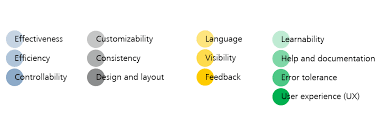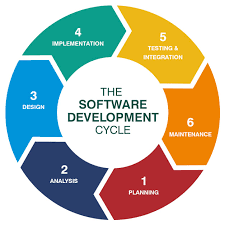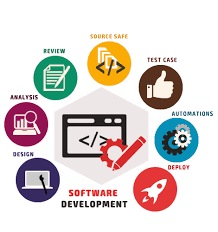Empowering Enterprises: The Role of a Leading Enterprise Software Development Company
The Role of an Enterprise Software Development Company in Today’s Business Landscape
In the fast-paced and competitive world of business, the need for efficient and scalable software solutions has never been greater. This is where enterprise software development companies play a crucial role. These companies specialize in creating customized software applications that meet the specific needs of large organizations and businesses.
What Sets Enterprise Software Development Companies Apart?
Unlike off-the-shelf software solutions, enterprise software development companies focus on building tailor-made applications that are designed to streamline operations, improve productivity, and drive growth. These companies have a deep understanding of the complexities and challenges faced by enterprises and work closely with their clients to deliver solutions that address their unique requirements.
The Benefits of Working with an Enterprise Software Development Company
Collaborating with an enterprise software development company offers numerous benefits, including:
- Customization: Tailored solutions that align with your business processes and goals.
- Scalability: Software that can grow and adapt as your business expands.
- Integration: Seamless integration with existing systems to ensure smooth operations.
- Data Security: Robust security measures to protect sensitive business information.
- Sustainability: Long-term support and maintenance to keep your software up-to-date.
The Role of Innovation in Enterprise Software Development
Innovation is at the heart of enterprise software development. These companies leverage cutting-edge technologies such as artificial intelligence, machine learning, cloud computing, and blockchain to create advanced solutions that drive efficiency and innovation within organizations. By staying ahead of technological trends, enterprise software development companies help their clients gain a competitive edge in the market.
Conclusion
In conclusion, enterprise software development companies play a vital role in empowering businesses to thrive in today’s digital age. By providing tailored solutions, fostering innovation, and ensuring scalability and security, these companies enable enterprises to navigate complex challenges and achieve sustainable growth. Partnering with an enterprise software development company can be a strategic investment that propels your business towards success.
Top 7 FAQs About Enterprise Software Development Companies
- What is an enterprise level software company?
- What companies are enterprise software?
- What is an enterprise systems developer?
- What is enterprise software examples?
- Which company is best for software development?
- What does an enterprise software developer do?
- What is the world’s largest enterprise software company?
What is an enterprise level software company?
An enterprise-level software company is a specialized firm that focuses on developing customized software solutions for large organizations and businesses. These companies have the expertise to create tailored applications that meet the specific needs and requirements of enterprises, such as scalability, integration with existing systems, data security, and long-term support. By collaborating with an enterprise-level software company, businesses can benefit from advanced technology solutions that streamline operations, enhance productivity, and drive growth in today’s competitive business landscape.
What companies are enterprise software?
When referring to enterprise software, it encompasses a wide range of companies that cater to the needs of large organizations and businesses. These companies specialize in developing customized software solutions tailored to meet the specific requirements of enterprises across various industries. Enterprise software companies often focus on creating scalable, secure, and integrated applications that streamline operations, enhance productivity, and drive business growth. By partnering with an enterprise software development company, businesses can leverage innovative technologies and expertise to optimize their processes and stay competitive in the ever-evolving market landscape.
What is an enterprise systems developer?
An enterprise systems developer is a professional specializing in creating and maintaining software solutions tailored for large organizations and businesses. These developers possess expertise in designing and implementing complex systems that address the specific needs of enterprises, such as streamlining operations, enhancing productivity, and facilitating communication across different departments. They work closely with clients to understand their requirements and develop customized applications that integrate seamlessly with existing infrastructure. Enterprise systems developers play a crucial role in driving innovation and efficiency within organizations by leveraging advanced technologies and best practices in software development.
What is enterprise software examples?
Enterprise software examples encompass a wide range of applications designed to meet the complex needs of large organizations and businesses. Some common examples include Customer Relationship Management (CRM) systems like Salesforce, Enterprise Resource Planning (ERP) software such as SAP and Oracle, Supply Chain Management (SCM) solutions like IBM Sterling Supply Chain Suite, and Human Resource Management (HRM) platforms such as Workday. These enterprise software applications are essential for streamlining operations, enhancing productivity, and improving overall efficiency within organizations by providing integrated solutions for various functions and departments.
Which company is best for software development?
When it comes to choosing the best company for software development, it ultimately depends on your specific needs and requirements. Factors to consider include the company’s expertise in your industry, their track record of successful projects, the technologies they specialize in, their approach to customization and scalability, as well as their reputation for delivering high-quality solutions on time and within budget. Conducting thorough research, reading client testimonials, and engaging in discussions with potential companies can help you identify the best fit for your software development needs. Remember that the “best” company is one that aligns closely with your business objectives and can offer a tailored solution that meets your unique challenges.
What does an enterprise software developer do?
An enterprise software developer specializes in creating customized software solutions tailored to the specific needs of large organizations and businesses. These developers work closely with clients to understand their requirements, design and develop complex applications, integrate them with existing systems, and ensure that the software meets high standards of quality, scalability, and security. Enterprise software developers play a crucial role in optimizing business processes, enhancing productivity, and driving innovation within enterprises by leveraging advanced technologies and industry best practices.
What is the world’s largest enterprise software company?
When it comes to the world’s largest enterprise software company, SAP stands out as a prominent leader in the industry. With a wide range of software solutions tailored for businesses of all sizes, SAP has established itself as a global powerhouse in enterprise software development. Known for its innovative products and services that streamline operations and drive efficiency, SAP continues to be a top choice for organizations looking to optimize their processes and stay competitive in today’s digital landscape.









